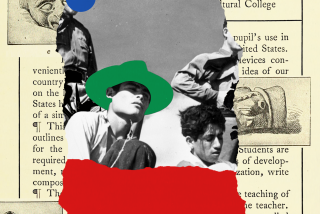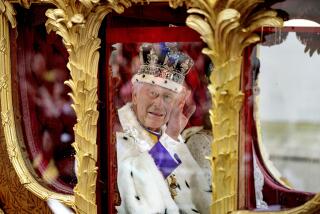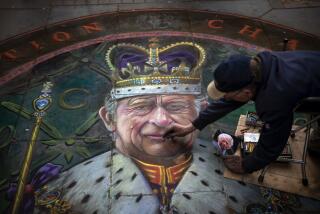The Good, the Bad and the Ancient
- Share via
The History Channel’s ambitious six-hour miniseries “A History of England” is probably best enjoyed with scones, lemon curd and Earl Grey tea.
Hosted by historian Simon Schama, the three-part series crosses three continents and hundreds of locations to bring Britain’s colorful past to life. Covering the years 3100 BC to AD 1603 (a second miniseries covering 1604 to the present is due next year), the documentary examines the artistic, cultural, political and economic events that tell the history of the British Empire.
For the record:
12:00 a.m. Nov. 1, 2000 For the Record
Los Angeles Times Wednesday November 1, 2000 Home Edition Calendar Part F Page 2 Entertainment Desk 1 inches; 22 words Type of Material: Correction
Wrong title--In an article about “A History of Britain” in Monday’s Calendar, the title of the History Channel miniseries was misstated in the introduction.
In conjunction with the miniseries, Schama has also written “A History of Britain: At the Edge of the World” (Talk Miramax Books). A second volume will be published in the spring.
The British-born Schama, who now lives in America, is a professor of art history at Columbia University in New York, and is the author of several books including the award-winning “Citizens,” about the French Revolution.
Schama recently talked by phone from his home in New York, about “A History of England.”
Question: How was the series received in England?
Answer: Fantastically. We thought we had done something sort of special. Actually, we knew if we were successful, it would enter the cultural bloodstream in a way. Almost 4 million people watched the second episode. Britain is in a rather tortured conversation with itself about what it means to be British and whether one can go on being British and hold one’s head up in the world. I wanted to make people feel that their past was really part of their present.
Q: Do Americans perceive history differently than the British?
A: Sometimes what happens in [America] is that there is a huge passion for history, but it is often very reverential, in the way we treat the Founding Fathers. There is a sense that history has to be about reverence really rather than something that is full of pain and conflict and many things to be proud of. It’s a roller coaster that is exciting and bewildering and sometimes frightening.
Q: Did the series or the book come first?
A: It was very much TV-driven. When I did say yes [to the series] I knew I wanted to write a book, and I didn’t want the book just to be the script between hard covers.
Q: With so many locations, your shooting schedule must have been very hectic?
A: It was horrific. We are not done, of course. We are about halfway through the second series. We have five films left to shoot. It is really a very tall order. I think we spent on the first program like three weeks on location in different places.
Q: I had never heard of that Neolithic village of Skara Brae you visit in the first episode. Is it well-known in England?
A: That is an extraordinary place. People in Scotland know about it, but nobody anywhere else knows about it. We deliberately started with that instead of Stonehenge. Stonehenge is an incredibly beautiful and powerful place, but there is not much you can know for sure about what it was for and who built it.
If you think of the problems the cameramen and the director had just trying to make lumps of rubble [cinematic]. We were very conscious that people would get sick of churches and castles. We used every technique we could. The main thing is to bring it to life in a good story.
Q: Has the interpretation of English history changed over the past century?
A: Well, there are some things that have changed very dramatically and some things I was aware of changing and, when I thought about it, I came to the conclusion that the older version was not to be thrown out all together.
In the first instance, it is very common in English history to sort of say the period from the fall of the Roman Empire to the coming of the Normans as [a time] when one bunch disappear and another bunch shows up--the Romans disappear and then, suddenly, overnight someone says it’s time for the Dark Ages and the Saxons came and destroyed everything.
It’s quite true that our documentation from that period is very murky and very slight, but a lot of great archeology has happened at late Roman sites, and what they have shown is that people didn’t flee to the hills when they saw men with horns on their helmets. They stayed absolutely put, and there were just a few hundred Saxons [in England] for the first sort of 50 years. The society kind of changed very slowly, rather subtly.
With the Norman invasion, it has been fashionable to say this too was not as dramatic as it seems. But my conclusion was it was every bit as dramatic and traumatic as the older histories say. Sometimes I want to reinstate the older, more clear-cut history because I think they are more right than wrong.
Q: It was amusing to learn that King Henry VIII composed music and had his own band.
A: I wanted to call him the Artist Formerly Known as Prince, because he was. But the very solemn director, a Catholic director, wouldn’t let me say that!
* “A History of Britain” airs Monday-Wednesday at 9 p.m. on the History Channel. The network has rated it TV-G (suitable for all ages).
More to Read
The complete guide to home viewing
Get Screen Gab for everything about the TV shows and streaming movies everyone’s talking about.
You may occasionally receive promotional content from the Los Angeles Times.







